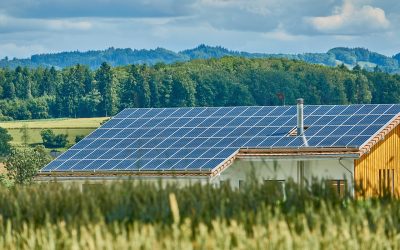You want to stay updated on the latest advancements in green energy and make more sustainable choices, but sometimes it feels overwhelming. The good news is that there are organizations out there that are working to make green energy education more accessible and engaging. In this article, we’ll explore one such initiative that encourages people like you to learn about green energy in a fun and informative way. So, if you’re curious to know how you can get involved and broaden your knowledge on this important topic, keep reading!
The Importance of Green Energy Education
Green energy education plays a crucial role in addressing the pressing global issues of climate change and sustainable development. By equipping individuals with knowledge and skills in renewable energy sources and technologies, we can empower them to make informed decisions, adopt sustainable practices, and contribute to the transition towards a greener future. In this article, we will explore the significance of green energy education, its benefits, challenges in promoting it, and various strategies for implementing effective green energy education programs.
Understanding the Need for Green Energy Education
As the world faces the consequences of increasing carbon emissions and reliance on fossil fuels, there is an urgent need for individuals to understand the importance of green energy alternatives. Green energy education helps individuals comprehend the environmental, economic, and social impacts of conventional energy sources while emphasizing the benefits of renewable energy. It enables learners to grasp concepts such as solar power, wind energy, hydroelectricity, and geothermal energy, and encourages them to critically think about the ways in which they can incorporate renewable energy into their lives.
Benefits of Green Energy Education
Investing in green energy education yields numerous benefits, both on an individual and societal level. At an individual level, green energy education enables people to make informed choices regarding their energy consumption, reducing their carbon footprint, and promoting conscious consumerism. Furthermore, it empowers individuals to pursue careers in green energy, contributing to the growth of the renewable energy sector and addressing the global skills gap.
On a societal level, green energy education fosters a collective sense of responsibility towards the environment, encouraging communities to come together and support sustainable initiatives. It also helps combat energy poverty by promoting the use of affordable renewable energy solutions in underserved communities. Additionally, green energy education drives innovation, as individuals equipped with knowledge in renewable energy are more likely to develop creative and sustainable solutions for the challenges of the future.
Challenges in Promoting Green Energy Education
While the benefits of green energy education are undeniable, there are several challenges that need to be addressed in order to effectively promote it. One such challenge is the lack of awareness and understanding of renewable energy amongst the general public. Many people are unaware of the potential of green energy and its ability to address climate change. Therefore, education campaigns and outreach programs should be implemented to raise awareness and disseminate accurate information about renewable energy sources and technologies.
Another challenge lies in the resistance to change within traditional education systems. Incorporating green energy education into existing curricula requires a shift in teaching methods and the inclusion of new material. Educators and administrators may be hesitant to introduce new topics or modify curricula due to time constraints or a lack of expertise in the subject matter. This calls for teacher training programs that equip educators with the necessary knowledge and resources to effectively teach green energy concepts.
Additionally, the dissemination of practical knowledge and hands-on experiences in green energy can be challenging due to the limited availability of resources and partnerships. Collaborations with green energy companies and organizations can facilitate access to practical training, internships, and field trips, enhancing the learning experience and creating a bridge between academia and industry.
Implementing Green Energy Education Programs
To successfully implement green energy education programs, it is essential to consider various strategies that cater to different educational levels and target audiences. These strategies include integrating green energy into curricula, providing teacher training programs, and fostering partnerships with green energy companies.
Integrating Green Energy into Curricula
Integrating green energy into existing curricula is a crucial step in ensuring that students develop a comprehensive understanding of renewable energy sources. By incorporating green energy concepts across multiple subjects such as science, technology, mathematics, and even humanities, students can experience a holistic approach to learning about sustainability. This integration allows for interdisciplinary connections and helps students recognize the relevance of green energy in various aspects of their lives.
Teacher Training Programs
To facilitate effective green energy education, it is essential to provide educators with the necessary knowledge and skills to teach green energy concepts. Teacher training programs should focus on equipping educators with up-to-date information about renewable energy technologies, teaching methodologies, and resources. These programs can be conducted through workshops, seminars, and online courses, ensuring that educators are well-prepared to deliver engaging and informative green energy lessons.
Partnerships with Green Energy Companies
Establishing partnerships with green energy companies can provide students with invaluable exposure to real-world applications of green energy. Collaborations can involve guest lectures, field trips to renewable energy facilities, or even internship opportunities for students to gain hands-on experience. Partnering with industry professionals allows students to witness firsthand the impact of green energy and provides a pathway for career exploration in the renewable energy sector.
Introducing Green Energy Concepts in Early Education
Early education is a crucial stage for introducing green energy concepts as it lays the foundation for a lifetime of sustainable practices and environmental consciousness. By teaching the basics of renewable energy and fostering a culture of sustainability, we can instill environmentally responsible habits from a young age.
Teaching the Basics of Renewable Energy
Introducing young learners to the concept of renewable energy can be done through interactive and age-appropriate activities. This can include experiments that demonstrate the power of solar energy, wind-powered toy projects, or storytelling sessions that highlight the importance of protecting the environment. By making learning enjoyable and engaging, young learners develop a positive attitude towards green energy and grow up with a natural inclination towards sustainable practices.
Fostering a Culture of Sustainability
In addition to teaching the technical aspects of renewable energy, it is vital to nurture a culture of sustainability in early education. This can be achieved by incorporating sustainable practices into daily routines, such as recycling, reducing energy consumption, and conserving water. By integrating sustainable habits into the school environment, educators can create a lasting impression on young minds, encouraging them to adopt a sustainable lifestyle.
Incorporating Green Energy into Science Lessons
Science lessons provide an ideal platform to explore green energy concepts in greater depth. By incorporating green energy topics into science curricula, educators can introduce concepts such as the greenhouse effect, climate change, and the importance of renewable energy as solutions. Through experiments, discussions, and research projects, students can develop a deeper understanding of the science behind green energy, fostering critical thinking skills and scientific literacy.
Creating Green Energy Education Initiatives in Higher Education
Higher education institutions have a significant role to play in developing expertise in green energy and driving innovation in the field. By introducing green energy degree programs, promoting research in renewable energy, and encouraging student engagement in green energy projects, higher education institutions can produce highly skilled professionals who can contribute to the advancement of green energy technologies and solutions.
Developing Green Energy Degree Programs
Higher education institutions can offer specialized degree programs in green energy to provide students with comprehensive knowledge and skills necessary for a career in the renewable energy sector. This can include degrees in renewable energy engineering, sustainable energy management, or environmental studies with a focus on green energy. By designing curriculum that balances theoretical knowledge with practical application, universities can produce graduates who are well-equipped to tackle the challenges of the energy transition.
Promoting Research in Green Energy
Research plays a vital role in advancing green energy technologies and improving the efficiency of renewable energy systems. Higher education institutions can prioritize research in green energy by establishing dedicated research centers or institutes that focus on sustainable energy solutions. By fostering collaboration between researchers, industry partners, and students, universities can contribute to the development of innovative and sustainable technologies.
Encouraging Student Engagement in Green Energy Projects
Universities can encourage student engagement in green energy projects by providing opportunities for research, internships, and hands-on experiences. This can include partnerships with industry organizations to offer practical training programs, participation in student-led energy initiatives, or involvement in research projects focusing on renewable energy. By involving students in real-world applications of green energy, universities can inspire innovation and entrepreneurship while preparing students for future careers in the renewable energy sector.
Engaging Communities in Green Energy Education
To create a lasting impact, green energy education should extend beyond the boundaries of educational institutions. Engaging communities through workshops, campaigns, and sustainable energy clubs can raise awareness, promote behavioral change, and foster a sense of collective responsibility towards the environment.
Organizing Workshops and Seminars
Workshops and seminars provide a platform for community members to learn about the benefits of green energy and understand how they can incorporate sustainable practices into their daily lives. These events can cover topics such as solar panel installation, energy-efficient home improvements, or sustainable transportation options. By hosting engaging and interactive sessions, community members can gain practical knowledge and feel inspired to take action towards a greener lifestyle.
Raising Awareness through Campaigns and Events
Campaigns and events centered around green energy can generate public interest, raise awareness, and encourage participation. This can include organizing community clean-up drives, sustainability fairs, or energy-saving challenges. By showcasing the positive impact of green energy and highlighting success stories, these campaigns and events inspire individuals to embrace sustainable practices and actively participate in the energy transition.
Creating Sustainable Energy Clubs
Sustainable energy clubs provide a platform for like-minded individuals to come together, exchange ideas, and collaborate on green energy projects. These clubs can be established in schools, universities, or within communities and can involve activities such as building solar-powered devices, organizing community energy audits, or advocating for renewable energy policies. Sustainable energy clubs foster a sense of community and provide support for individuals interested in pursuing green energy initiatives.
Government Support for Green Energy Education
To effectively promote green energy education, government support is essential. Governments can allocate funding for green energy education initiatives, implement policy changes to include green energy education in curricula, and collaborate with educational institutions to develop comprehensive programs.
Allocating Funding for Green Energy Education Initiatives
Financial resources are crucial for developing and sustaining green energy education programs. Governments can allocate funding specifically dedicated to green energy education initiatives, ensuring that schools and universities have the necessary resources to implement effective programs. This funding can be used for infrastructure development, teacher training, research grants, and student scholarships in the field of green energy.
Policy Changes to Include Green Energy Education
Government policies play a significant role in shaping education systems. By implementing policy changes that mandate the inclusion of green energy education in school curricula and higher education programs, governments can ensure that all students have access to comprehensive knowledge about renewable energy. Additionally, policies can incentivize educational institutions to prioritize green energy education by providing accreditation or recognition for programs that meet specific criteria.
Collaboration with Education Institutions
Collaboration between governments and educational institutions is crucial for the successful implementation of green energy education policies and initiatives. Governments can work together with schools, universities, and educational boards to design curricula, develop teacher training programs, and establish partnerships with green energy companies. By fostering collaboration, governments can leverage the expertise of educational institutions to create effective green energy education programs that align with national priorities.
The Role of Technology in Green Energy Education
Technology plays a vital role in enhancing green energy education by providing innovative tools and platforms for learning and exploration. Online learning platforms, virtual reality simulations, and apps for monitoring energy consumption are just a few examples of how technology can support and enhance green energy education.
Utilizing Online Learning Platforms
Online learning platforms provide accessible and flexible learning opportunities for individuals interested in green energy education. These platforms can offer interactive courses, webinars, and resources that cover topics ranging from basic green energy concepts to advanced technical knowledge. Online learning platforms provide a self-paced learning experience, allowing individuals to acquire knowledge at their own convenience, regardless of geographic location.
Virtual Reality Simulations for Renewable Energy
Virtual reality (VR) simulations offer immersive experiences that can facilitate learning and understanding of complex green energy concepts. By using VR technology, students can explore virtual environments and interact with renewable energy systems, such as solar farms or wind turbines. This hands-on approach enables learners to visualize the impact of their decisions and gain practical experience in a safe and controlled setting.
Apps and Tools for Monitoring Energy Consumption
Apps and tools that monitor energy consumption can raise awareness about individual energy usage and encourage behavior change. By tracking energy consumption in real-time and providing insights into the environmental impact of specific activities, these apps and tools empower individuals to make informed choices and adopt energy-efficient practices. This integration of technology into everyday life promotes a culture of sustainability and reinforces the importance of green energy.
Promoting Careers in Green Energy
Promoting careers in the green energy sector is crucial for attracting talented individuals to the field and addressing the skills gap in the renewable energy industry. Highlighting job opportunities, offering internships and apprenticeships, and establishing mentorship programs are effective strategies for encouraging individuals to pursue careers in green energy.
Highlighting Job Opportunities in the Green Energy Sector
Promoting green energy careers involves showcasing the diverse range of job opportunities available in the renewable energy sector. From engineers and technicians to project managers and policy analysts, there is a wide array of roles that individuals can pursue. By highlighting the potential for career growth, competitive salaries, and the opportunity to make a positive impact on the environment, individuals are more likely to consider green energy as a viable career path.
Internships and Apprenticeships in Renewable Energy
Internship and apprenticeship programs provide valuable practical experience for individuals interested in a career in green energy. Collaborations between educational institutions, green energy companies, and government entities can facilitate the establishment of such programs. By offering hands-on training and mentorship, internships and apprenticeships allow individuals to develop industry-specific skills, expand their professional networks, and bridge the gap between education and the workforce.
Mentorship Programs in Green Energy
Mentorship programs offer guidance and support to individuals pursuing careers in the green energy sector. By pairing experienced professionals with aspiring professionals, mentorship programs provide a platform for knowledge transfer, career advice, and personal development. Mentors can share insights into the industry, offer guidance on career progression, and provide valuable connections that can aid in career advancement.
Overcoming Barriers to Green Energy Education
Several barriers hinder the widespread adoption and implementation of green energy education. These barriers include the lack of funding for education programs, resistance to change in traditional education systems, and misconceptions about green energy. Overcoming these barriers requires a multi-faceted approach that involves advocacy, policy changes, and community engagement.
Lack of Funding for Education Programs
Funding is a significant barrier to implementing effective green energy education programs. Limited financial resources may prevent schools and universities from investing in infrastructure, training teachers, and providing necessary learning resources. To overcome this barrier, governments, educational institutions, and stakeholders need to collaborate in securing dedicated funding for green energy education initiatives. Grant programs, partnerships with private organizations, and public-private collaborations can help alleviate the financial constraints.
Resistance to Change in Traditional Education
Traditional education systems often face resistance to incorporating new subjects or modifying existing curricula. This resistance is driven by concerns about overcrowded curricula, lack of resources, and a hesitancy to deviate from established teaching methods. Overcoming this barrier requires stakeholder engagement, which includes informing educators, administrators, parents, and policymakers about the importance and benefits of green energy education. By addressing these concerns and showcasing the relevance of green energy education, resistance to change can be minimized.
Addressing Misconceptions about Green Energy
Misconceptions and misinformation surrounding green energy can hinder the acceptance and adoption of renewable energy technologies. Addressing these misconceptions involves providing accurate information, debunking common myths, and showcasing the successes and benefits of green energy. Effective communication strategies, such as public awareness campaigns, targeted messaging, and collaboration with experts and scientists, can help dispel misconceptions and foster a more informed understanding of green energy.
Measuring the Impact of Green Energy Education
To evaluate the effectiveness of green energy education initiatives, it is essential to measure the impact on knowledge levels, attitudes, behaviors, and career paths. Measuring the impact allows for continuous improvement and justifies investments in green energy education.
Evaluating Knowledge and Awareness Levels
Evaluation of knowledge and awareness levels can be done through assessments, surveys, and quizzes to gauge the understanding of green energy concepts before and after educational interventions. This allows for the identification of knowledge gaps and areas that require further emphasis in green energy education.
Assessing Changes in Attitudes and Behaviors
Changes in attitudes and behaviors can be assessed through surveys, interviews, or focus group discussions that explore participants’ perceptions, values, and actions towards green energy. These assessments help gauge whether green energy education interventions have influenced individuals’ behaviors, such as adopting energy-saving practices or making environmentally conscious choices.
Tracking Career Paths of Green Energy Education Graduates
Tracking career paths of green energy education graduates provides insight into the effectiveness of educational programs in preparing individuals for careers in the renewable energy sector. By following graduates’ professional trajectories, institutions can assess the alignment between program outcomes and industry needs, highlighting areas for improvement and potential avenues for collaboration between academia and industry.
In conclusion, green energy education plays a pivotal role in addressing environmental challenges and driving the transition towards a more sustainable future. By understanding the need for green energy education, recognizing its benefits, and implementing effective strategies, we can empower individuals, communities, and societies to embrace renewable energy and make positive contributions towards a greener world. Through government support, technological advancements, and collaborative efforts, we can ensure that green energy education becomes a priority and shapes the future of energy sustainability for generations to come.










